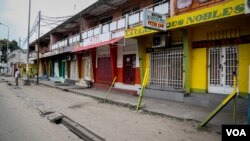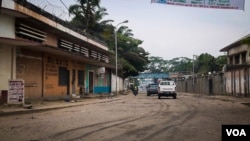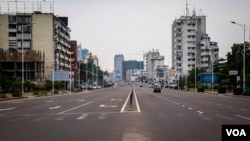The streets of the Kinshasa were quiet Wednesday after the opposition called for a general strike. The main opposition coalition in the Democratic Republic of Congo is protesting a deal signed earlier this week between President Joseph Kabila and a smaller opposition platform that would postpone elections by nearly two years and leave Kabila in office in the interim.
Kinshasa experienced a so-called "dead city day" for the third time this year. It is similar to a general strike and designed to show the population’s discontent with the government. Children are to stay away from school and adults from work.
The main opposition coalition, the Rassemblement, called the strike to demand Kabila step down in December at the end of his second and, under the constitution, final term.
Near the central market, a young man named Kabia Ndaye says Kinshasa supports the strike because it is for them. It is because the people are unhappy with the leaders of the country. Observing the strike is a sacrifice, Ndaye admits, but a patriotic sacrifice.
Kinshasa’s normally chaotic early morning streets were quiet and nearly empty. Shops were sealed off with steel doors and public buses carried only a few passengers. But many market traders, money changers, and mobile credit vendors were working by midday and some shops opened as well.
Big sacrifice
Kinshasa is a city of more than 10 million people, the vast majority poor and only a fraction with salaried employment. Taking a day off work could mean a day without food or for the fortunate few with salaries risking punishment.
Several state employees said they had been instructed to work during the strike, but would not give more detail.
At work crafting baskets, carpenter Herman Ibanda says the strike is a bad idea. He says for the little people in Congo, everyday life means going out and looking for something to eat. He said the country’s politicians should sort out this crisis among themselves so the little people do not suffer.
Last month, street demonstrations resulted in dozens of deaths as security forces and protesters clashed. There had been fears similar problems might arise Wednesday. In the Limete neighborhood, an opposition stronghold, police used tear gas to disperse a group of opposition-supporting young men, but calm soon returned, and the strike appears to have remained free of violence in the capital.
Kabila’s ruling coalition had called on the people of Kinshasa to ignore the strike, warning them a day without work is a day lost for the electoral process.











